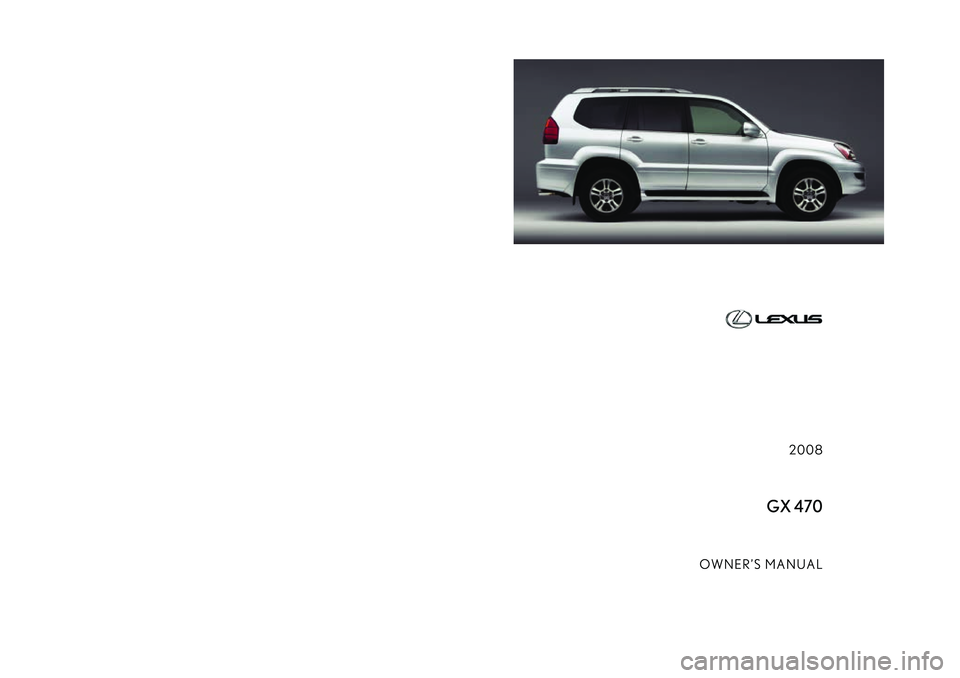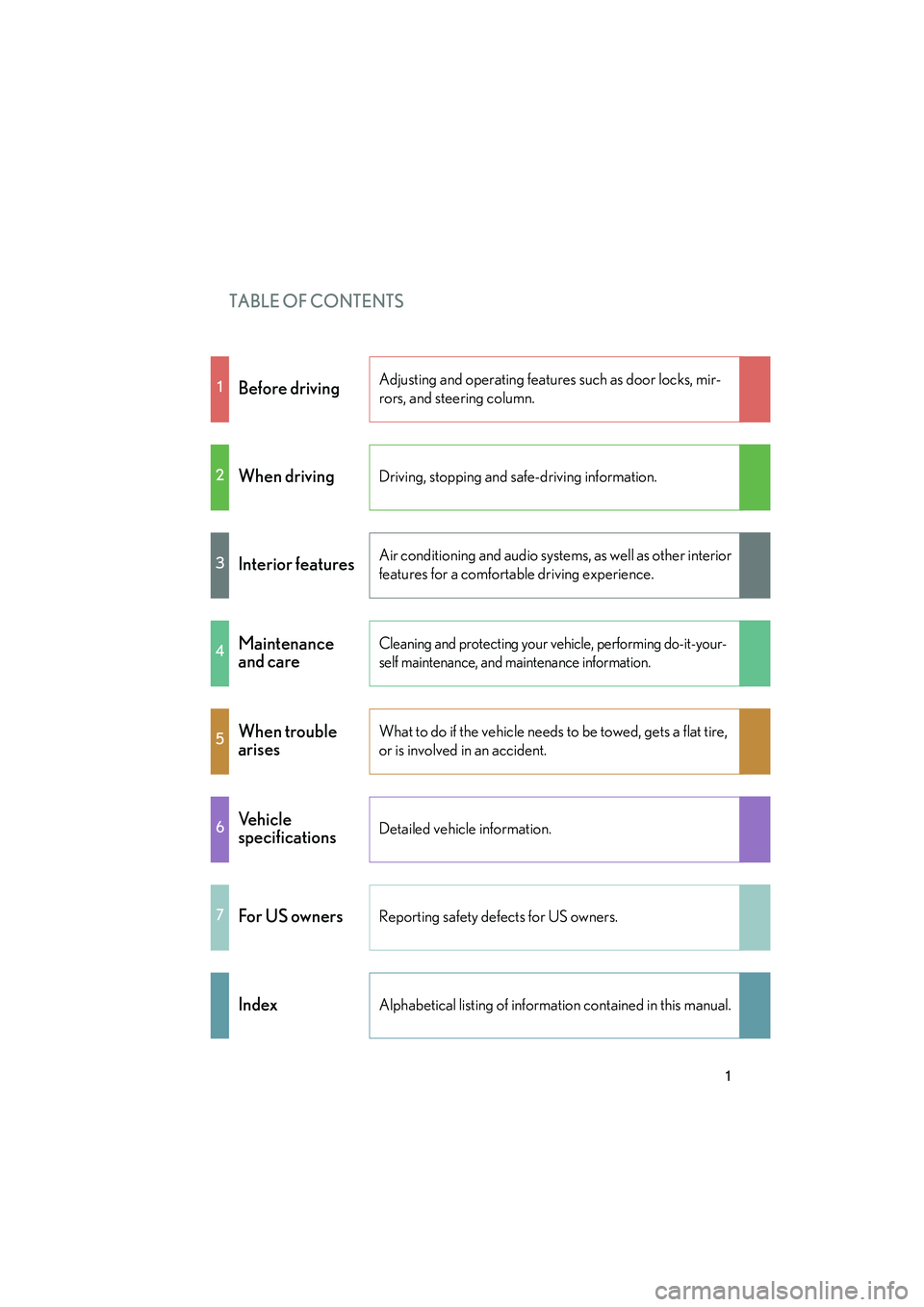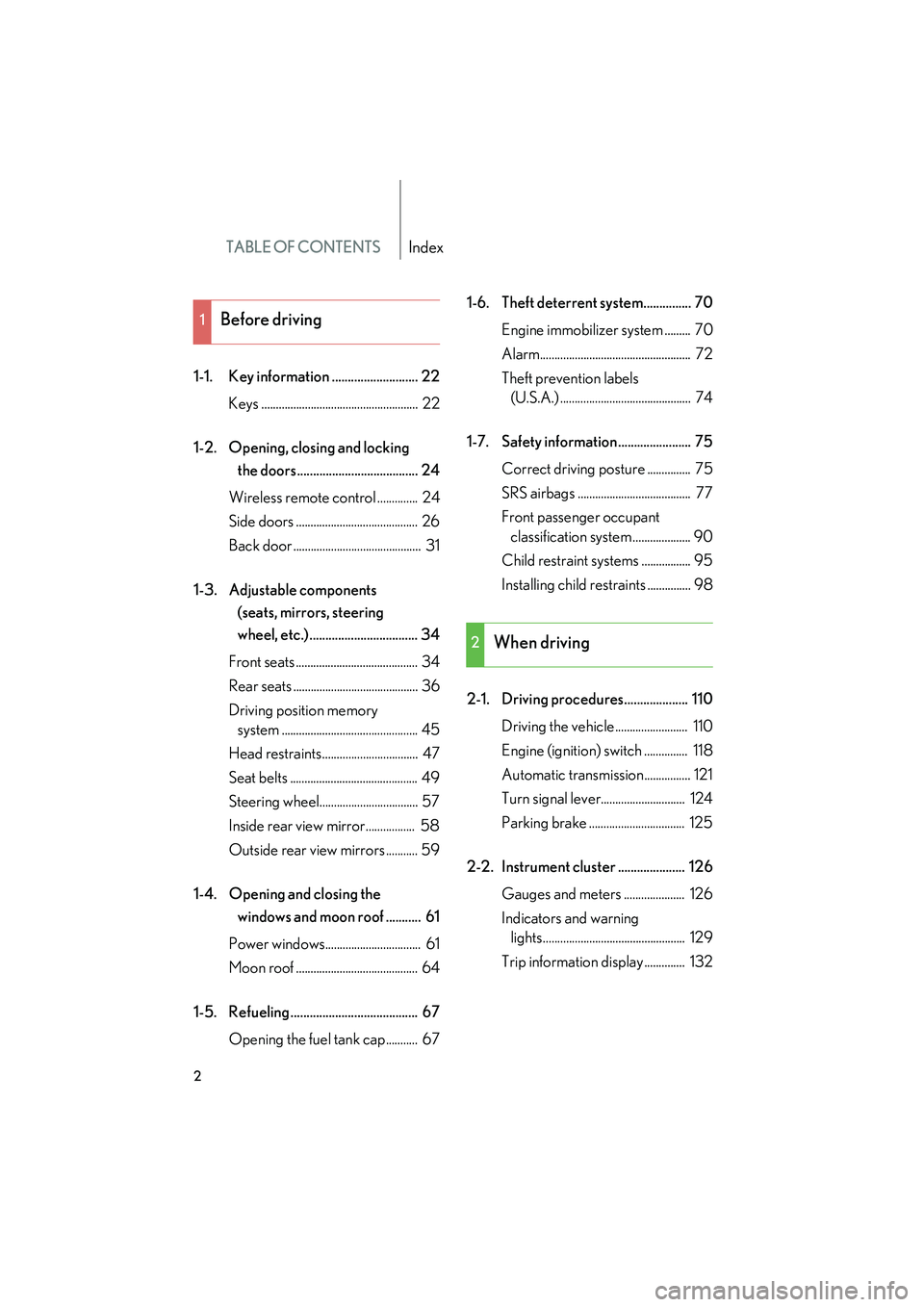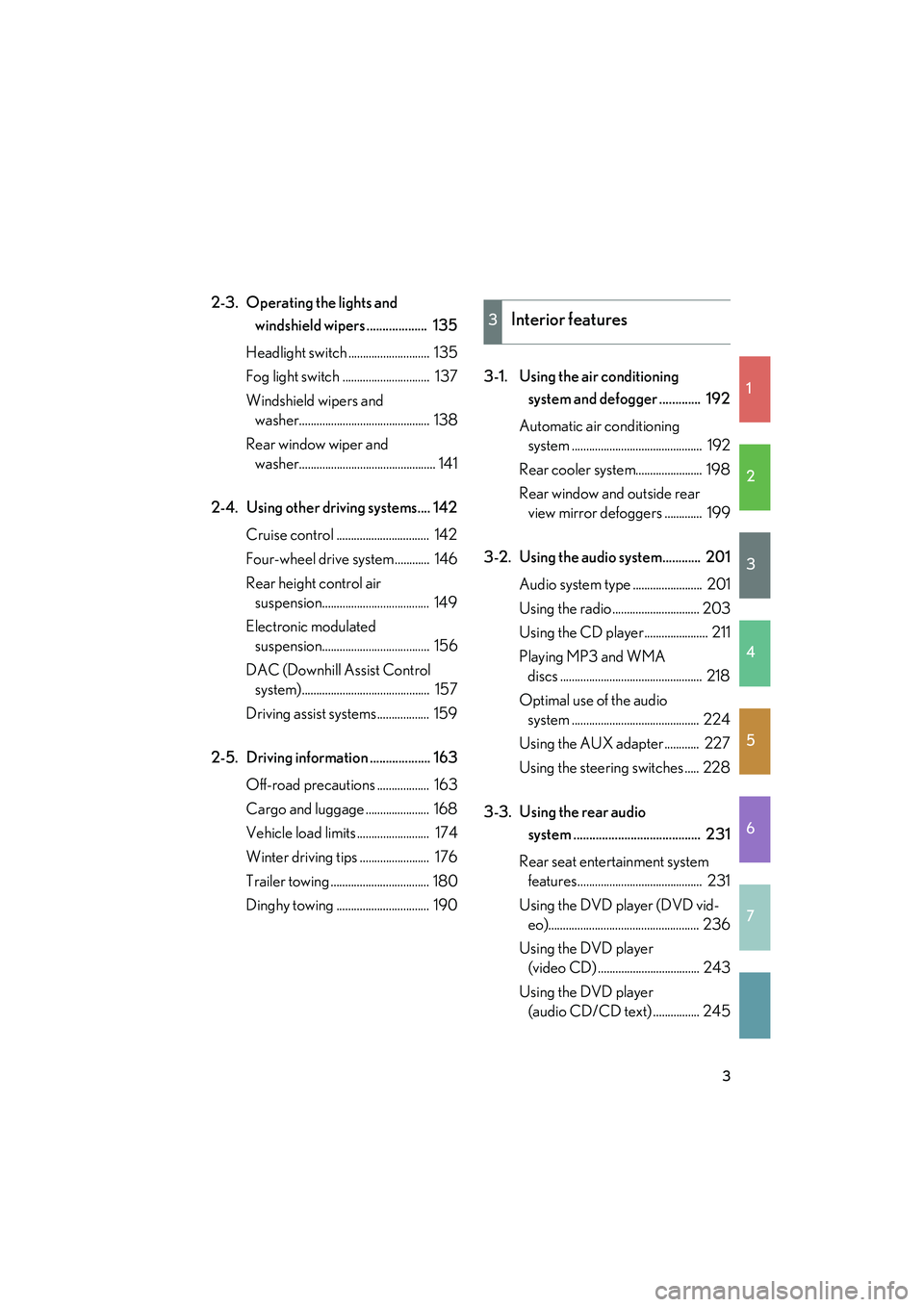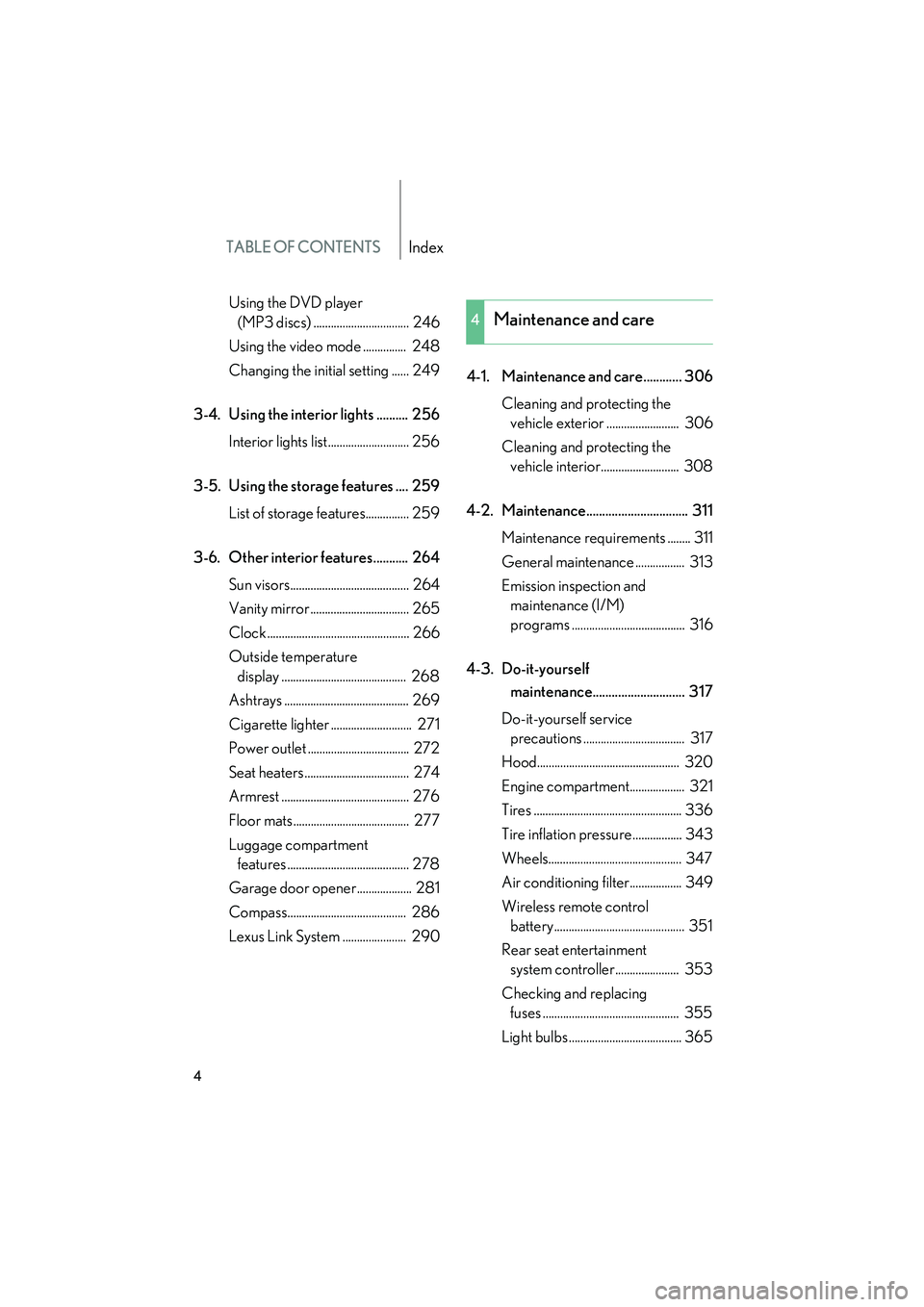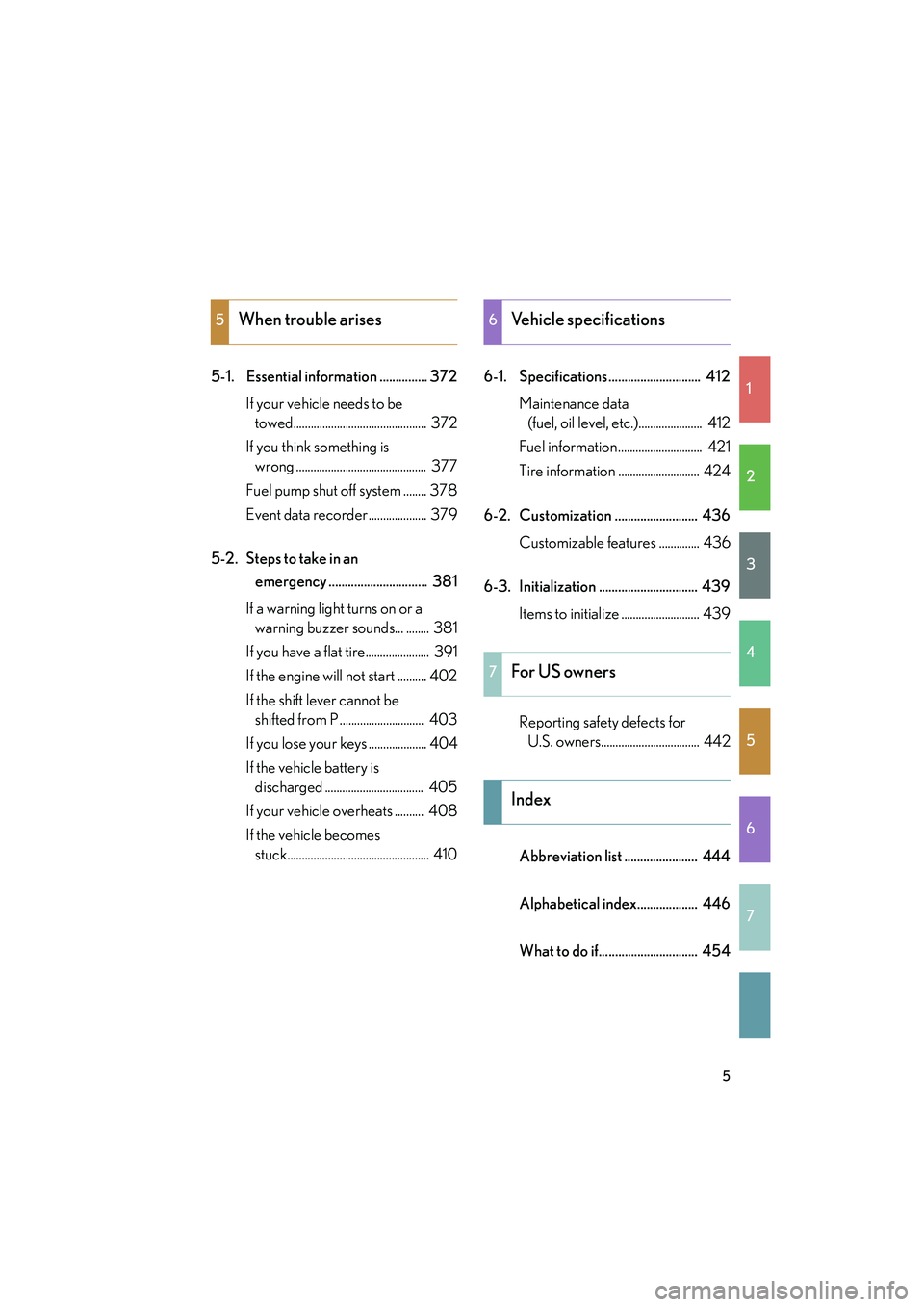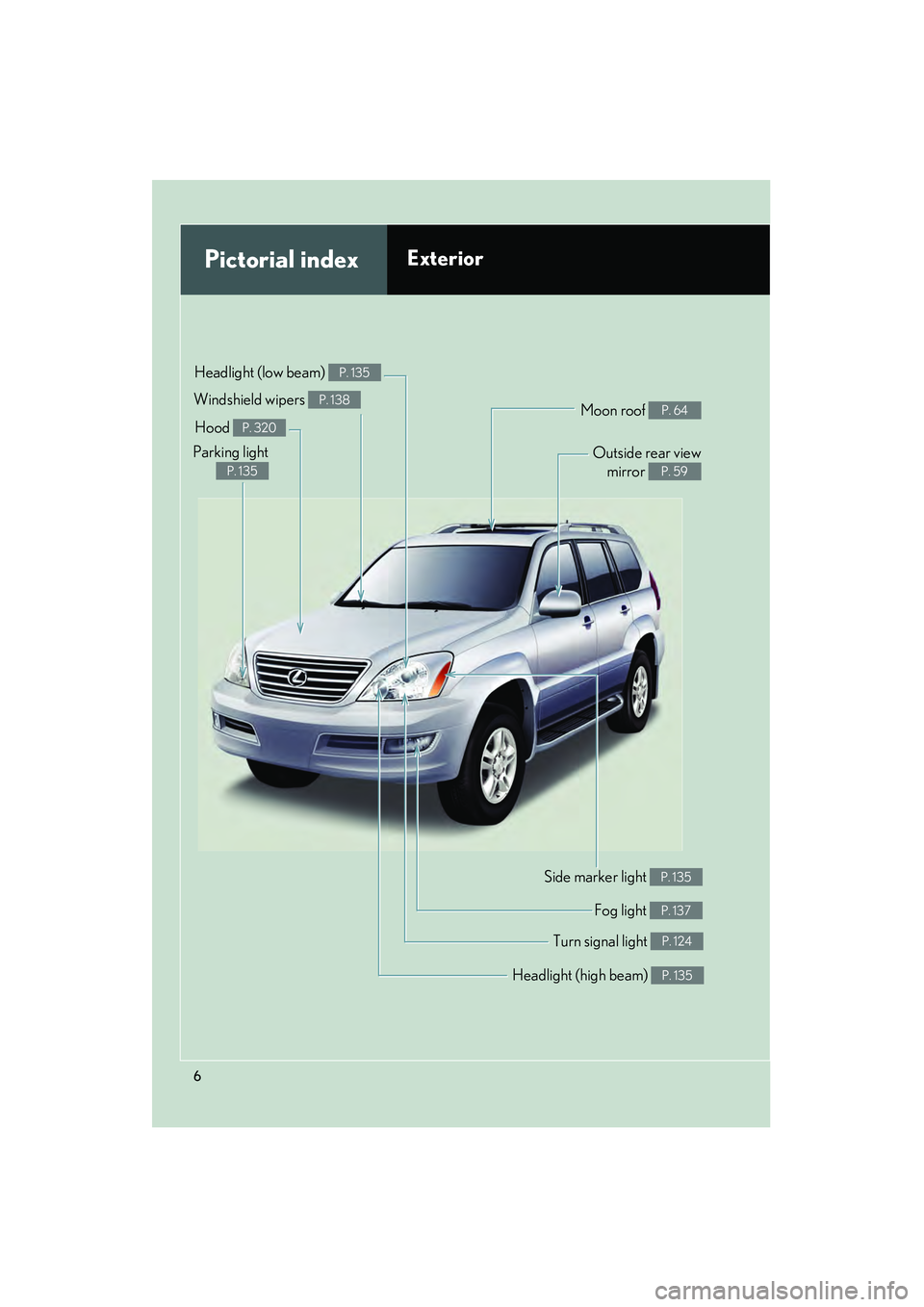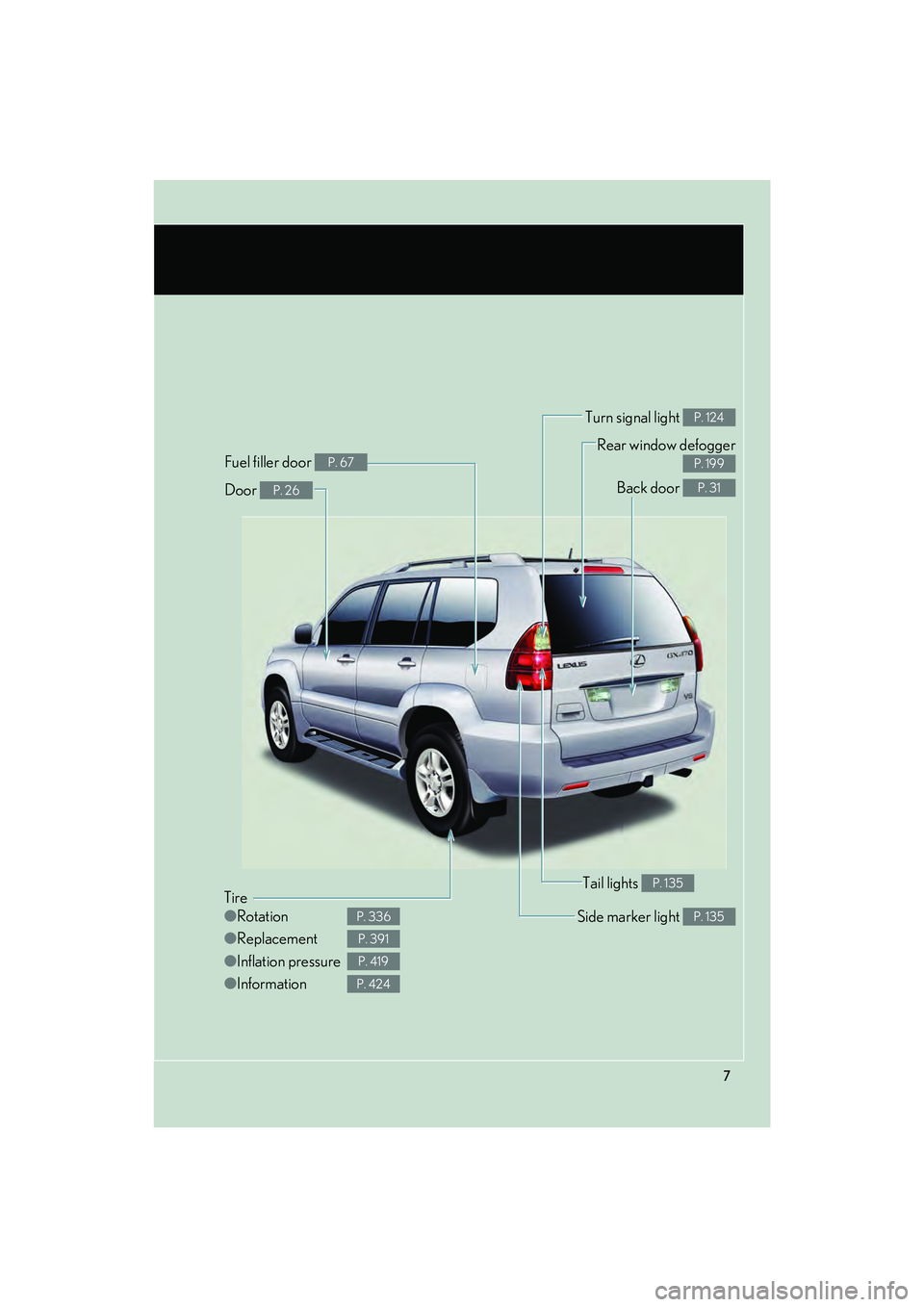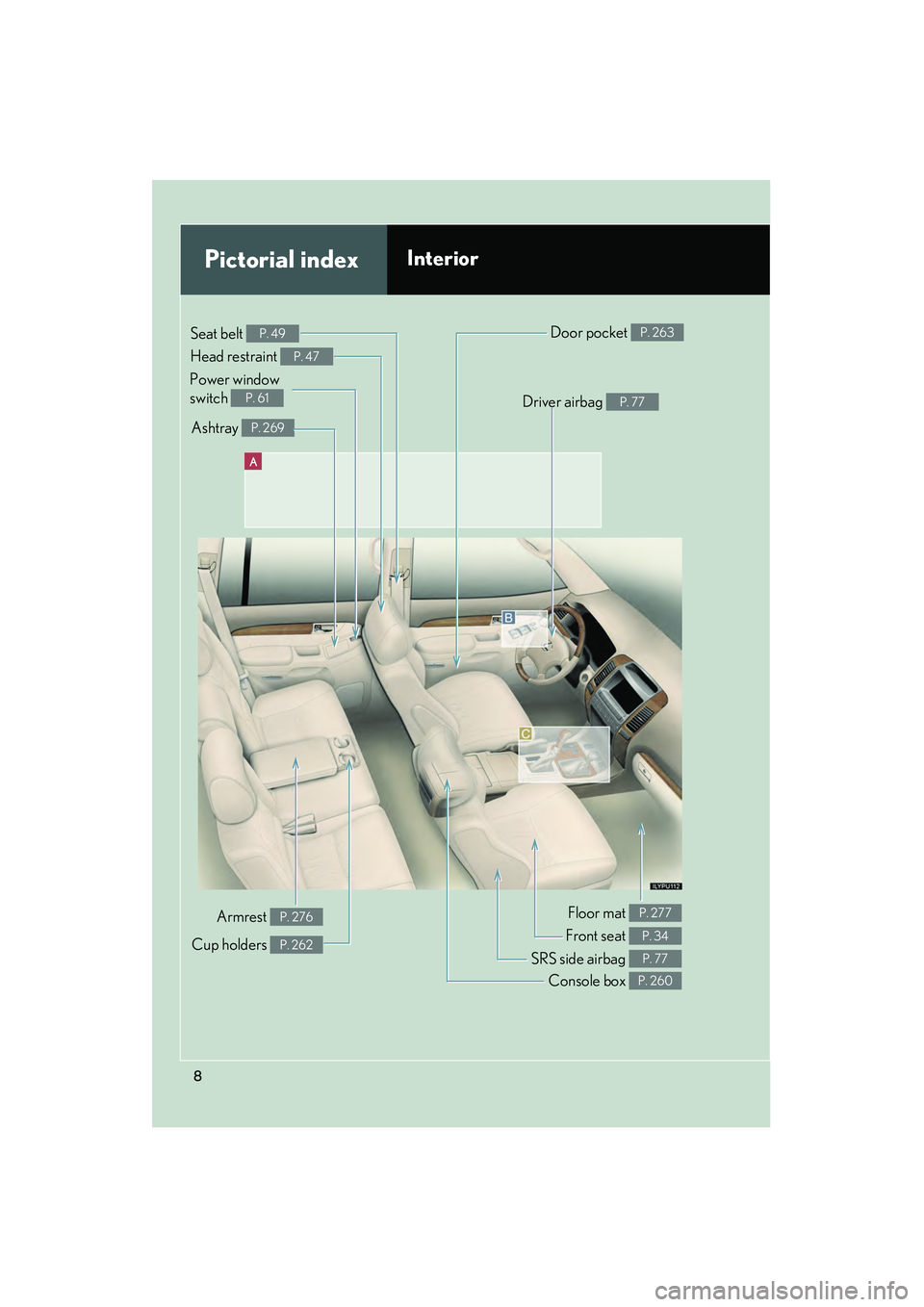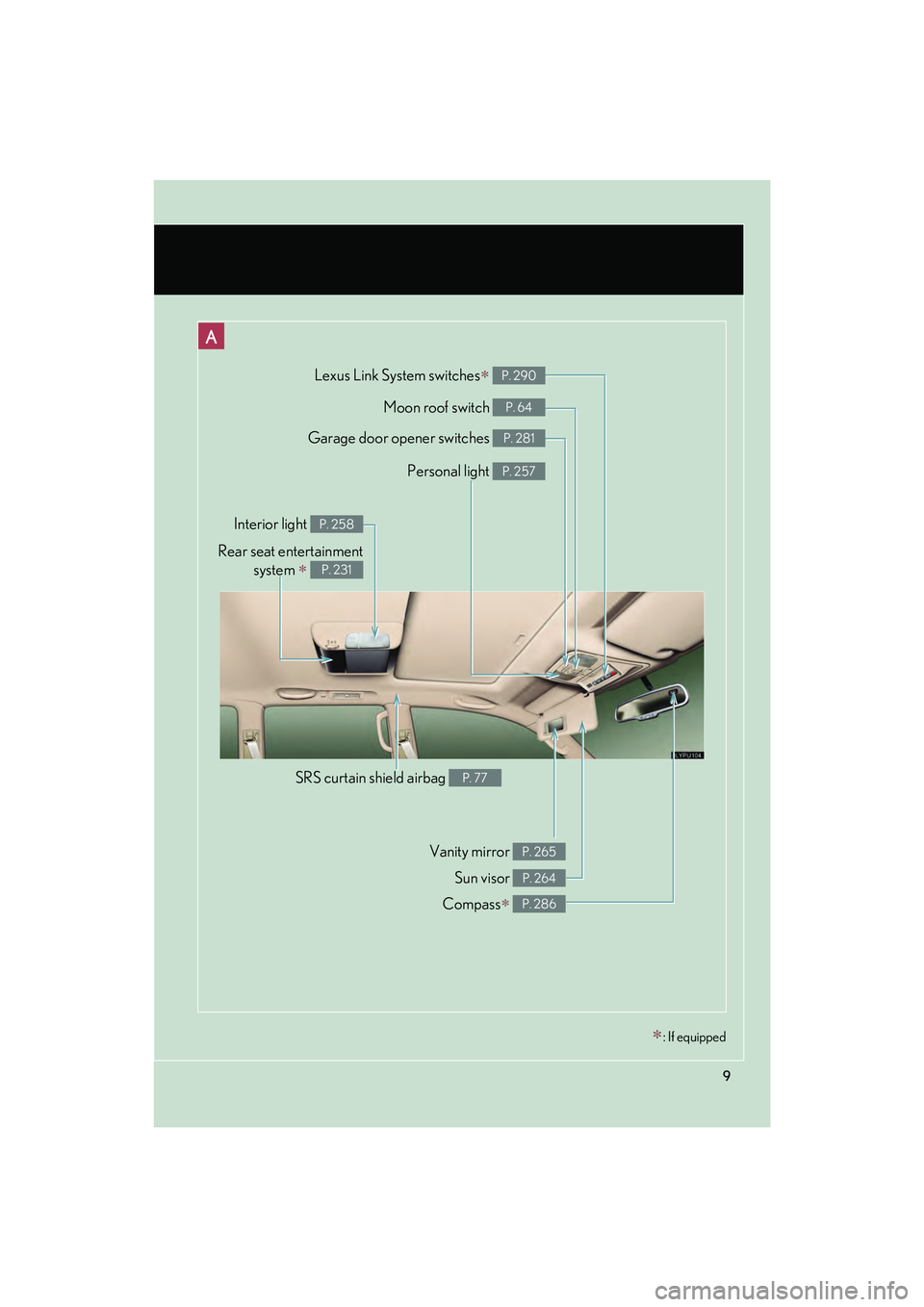-
Contents
-
Table of Contents
-
Bookmarks
Quick Links
TABLE OF CONTENTS
Before driving
1
When driving
2
Interior features
3
Maintenance
4
and care
When trouble
5
arises
Vehicle
6
specifications
For owners
7
Index
Adjusting and operating features such as door locks, mir-
rors, and steering column.
Driving, stopping and safe-driving information.
Air conditioning and audio systems, as well as other interior
features for a comfortable driving experience.
Cleaning and protecting your vehicle, performing do-it-your-
self maintenance, and maintenance information.
What to do if the vehicle needs to be towed, gets a flat tire,
or is involved in an accident.
Detailed vehicle information.
Reporting safety defects for US owners and seat belt in-
structions for Canadian owners.
Alphabetical listing of information contained in this manual.
1
Summary of Contents for Lexus GX 470 2009

Предыдущую запись по жалобам обиженных заблокировали, публикую по новой.
После скачивания мануала, для его просмотра, необходимо извлечь файлы из архива!
При просмотре файлов прямо в архиве — они не отображаются!
___________________________________________
ССЫЛКА НА МАНУАЛ
КАЧАЕМ ЧЕРЕЗ КОМПЬЮТЕР! ЧЕРЕЗ ТЕЛЕФОН МОЖЕТ ВЫДАТЬ ОШИБКУ!
___________________________________________
Объем файла 102 Mb.
При возникновении проблем с доступом к архиву, пишите мне в личку
мануал lexus gx 470, мануал prado 120, книга gx470, книга prado 120, 1GR-FE
-
nekesha
- Администратор
- Сообщения: 1668
- Зарегистрирован: 17 дек 2014, 03:43
- Благодарил (а): 2 раза
- Поблагодарили: 6 раз
Lexus GX 470 2002-2009 / Лексус ДжиИкс 470 2002-2009
Руководство по эксплуатации, техобслуживанию и ремонту Lexus GX 470 / Лексус ДжиИкс 470
Operation, Maintenance and Repair Manual Lexus GX 470
- Года выпуска: 2002-2009
Year of release: 2002-2009
Бензиновые двигатели: 2UZ-FE, 1GR-FE
Gasoline engines: 2UZ-FE, 1GR-FE
- Язык: Русский
Формат: PDF
Размер: 386 Мб
Russian language
Format: PDF
Size: 386 MB
Скачать документацию Лексус ДжиИкс 470
Download the documentation of Lexus GX 470
для распаковки используйте пароль — avtoproblem-net.ru
use the password to unpack — avtoproblem-net.ru

WE REALLY CARE ABOUT YOU − PLEASE BUCKLE UP
Lexus has made a special effort to encourage use of seat belts.
Lexus belts are:
DComfortable
DEasy to use
DConvenient
We encourage you to use your belts every time you drive.

GAS STATION INFORMATION
DFuel selection:
Select premium unleaded gasoline with an Octane Rating of 91 (Research Octane Number 96) or higher for optimum engine performance. However, if such premium type cannot be obtained, you may temporarily use unleaded gasoline with an Octane Rating as low as 87 (Research Octane Number 91).
DFuel tank capacity:
87 L (23 gal., 19.1 Imp. gal.)
DEngine oil:
“Toyota Genuine Motor Oil” or equivalent Oil grade: ILSAC multigrade engine oil. Recommended oil viscosity: SAE 5W−30
Oil capacity: Drain and refill
With filter 6.2 L (6.5 qt., 5.5 Imp. qt.) Without filter 5.7 L (6.0 qt., 5.0 Imp. qt.)
See page 511 for detailed information.
DEngine coolant:
Capacity: 12.9 L (13.6 qt., 11.4 Imp. qt.)
Coolant type — “Toyota Super Long Life Coolant” or similar high quality ethylene glycol based non−silicate, non−amine, non−nitrite, and non−borate coolant with long−life hybrid organic acid technology (Coolant with long−life hybrid organic acid technology is a combination of low phosphates and organic acids.)
Do not use plain water alone.
For checking the engine coolant, see page 514.
DAutomatic transmission:
Fluid type — “Toyota Genuine ATF WS” See page 519 for detailed information.
DTire information:
See pages 523 through 544 for detailed information.
DTire inflation pressure:
Tire size: P265/65R17 110S
Tire inflation pressure: 220 kPa (2.2 kgf/cm2 or bar, 32 psi)
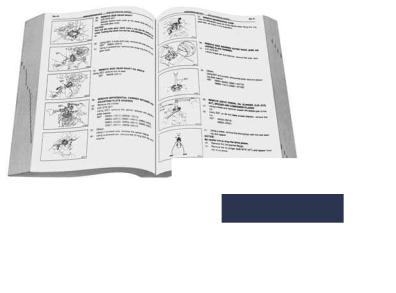
You should know as much about the quality and importance of proper maintenance of your new vehicle as the people who built it.
The Lexus authorized Repair Manual tells you how to maintain your vehicle and enables you to correctly perform your own maintenance.
The best way to keep your new vehicle in top running order is to maintain it properly from the moment you drive it off the showroom floor.
The Lexus authorized Repair Manual is packed with literally everything you need to know to perform your own maintenance in virtually every area of your new vehicle.
CM−1

Maintenance procedures for the engine, chassis, body, electrical system, and more, are clearly explained and illustrated.
Periodic maintenance and tune−up
Periodic maintenance and tune−up helps to prevent small problems from growing into larger ones later on. The repair manual outlines exactly what maintenance is required and clearly explains how to do the work yourself step−by−step.
Areas covered include such things as spark plug replacement, valve clearance adjustment and engine oil and filter replacement.
Where to obtain the
Repair Manual
The repair manual for GX470 may be purchased from any Lexus dealer or the Material Distribution Center. To purchase the repair manual, please contact your Lexus dealer or call the Material Distribution Center toll−free at 1−800−622−2033.
CM−2

FOREWORD
Congratulations on your selection of this Lexus. In Lexus vehicles we have invested all our engineering and design resources; all the know− how we have gained in over 60 years of making automobiles; the highest motivation of our most talented employees; and our tradition of incessant striving toward ever greater quality.
This Owner’s Manual explains the features of your new Lexus. Please read it and follow the instructions carefully so that you can enjoy many years of safe motoring.
When it comes to service, remember that your Lexus dealer knows your vehicle very well and is interested in your complete satisfaction. Your Lexus dealer will provide quality maintenance and any other assistance you may require.
If there is not a Lexus dealer near you, please call the following number:
U.S. OWNERS
If you need emergency assistance for any reason, please call the following number.
|
D |
When traveling in the U.S. mainland or Canada: |
Toll−free:1−800−25−LEXUS or 1−800−255−3987 |
|
Lexus Roadside Assistance |
||
|
D |
Hawaii: |
Toll−free:1−800−25−LEXUS or 1−800−255−3987 |
|
Servco Automotive Roadside Assistance/Customer Services |
CANADIAN OWNERS
D When traveling in Canada or the U.S. mainland:
Lexus Roadside Assistance/Customer Service Toll−free:1−800−26−LEXUS or 1−800−265−3987
Please leave this Owner’s Manual in this vehicle at the time of resale. The next owner will need this information also.
All information and specifications in this manual are current at the time of printing. However, because of the Lexus policy of continual product improvement, we reserve the right to make changes at any time without notice.
Please note that this manual applies to all models and explains all equipment, including options. Therefore, you may find some explanations for equipment not installed on your vehicle.
Please access our websites for further information.
|
D |
The U.S. mainland |
www.lexus.com |
|
D |
Hawaii |
www.servcolexus.com |
|
D |
Canada |
www.lexus |
I
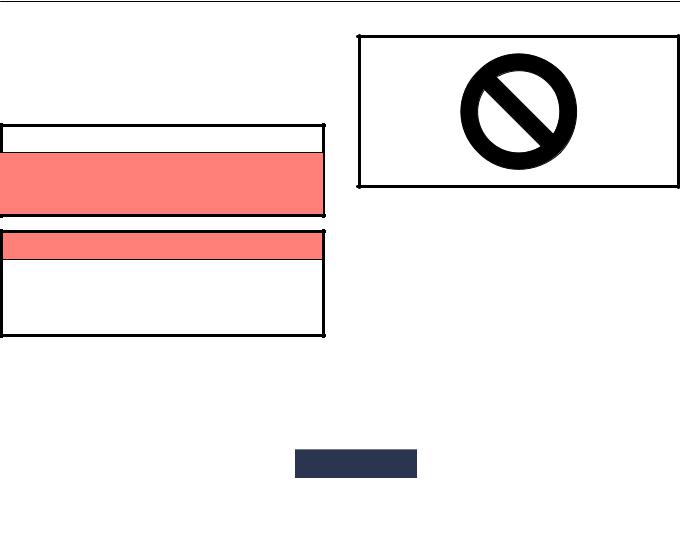
IMPORTANT INFORMATION ABOUT THIS MANUAL
IMPORTANT INFORMATION ABOUT THIS MANUAL
Safety and vehicle damage warnings
In this manual you will see CAUTION and NOTICE warnings. These are used in the following ways:

This is a warning against anything which may cause injury to people if the warning is ignored. You are informed about what you must or must not do in order to reduce the risk of injury to yourself and others.
NOTICE
This is a warning against anything which may cause damage to the vehicle or its equipment if the warning is ignored. You are informed about what you must or must not do in order to avoid or reduce the risk of damage to your Lexus and its equipment.
Safety symbol
In this manual, you will also see a circle with a slash through it. This means “Do not”, “Do not do this”, or “Do not let this happen”.
Your Lexus Owner’s Manual provides you with a considerable amount of information. To use this information most effectively, please take the time to familiarize yourself with the contents and use of the manual.
II

IMPORTANT INFORMATION ABOUT YOUR LEXUS
IMPORTANT INFORMATION ABOUT YOUR LEXUS
Occupant restraint systems
Lexus encourages you and your family to take the time to read Section 1−6 of this Owner’s Manual carefully. In terms of helping you understand how you can receive the maximum benefit of the occupant restraint systems this vehicle provides, Section 1−6 of this Owner’s Manual is the most important Section for you and your family to read.
Section 1−6 describes the function and operation concerning seats, seat belts, SRS airbags and child restraint systems of this vehicle and some potential hazards you should be aware of. These systems work together along with the overall structure of this vehicle in order to provide occupant restraint in the event of a crash. The effect of each system is enhanced when it is used properly and together with other systems. No single occupant restraint system can, by itself, provide you or your family with the equal level of restraint which these systems can provide when used together. That is why it is important for you and your family to understand the purpose and proper use of each of these systems and how they relate to each other.
The purpose of all occupant restraint systems is to help reduce the possibility of death or serious injury in the event of a collision. None of these systems, either individually or together, can ensure that there is no injury in the event of collision. However, the more you know about these systems and how to use them properly, the greater your chances become of surviving an accident without death or serious injury.
Seat belts provide the primary restraint to all occupants of the vehicle, and every occupant of the vehicle should wear seat belts properly at all times. Children should always be secured in child restraint systems that are appropriate for their age and size. SRS (Supplemental Restraint System) airbags are, as their names imply, designed to work with, and be supplemental to, seat belts and are not substitutes for them. SRS airbags can be very effective in reducing the risk of head and chest injuries by preventing contact of the head and chest with interior portions of the vehicle.
In order to be effective, the SRS airbags must deploy with tremendous speed. The rapid deployment of the SRS airbags makes the SRS airbags themselves potential sources of serious injury if an occupant is too close to an airbag, or if an object or some part of his or her body has been placed between the occupant and the airbag at the time of deployment. This is just one example of how the instructions in Section 1−6 of this Owner’s Manual will help ensure proper use of the occupant restraint systems, and increase the safety they can provide to you and your family in the event of an accident.
recommends you to read the provisions in Section 1−6 refer to them as needed during your time of this vehicle.
III

IMPORTANT INFORMATION ABOUT YOUR LEXUS
Event data recorder
Your vehicle has computers that monitor and control certain aspects of your vehicle. These computers assist in driving and maintaining optimal vehicle performance. Besides storing data useful for troubleshooting, there is a system to record data in a crash or a near car crash event. This is called an Event Data Recorder (EDR).
The SRS airbag sensor assembly contains the EDR. In a crash or a near car crash event, this device may record some or all of the following information:
DEngine speed
DWhether the brake pedal was applied or not
DVehicle speed
DTo what extent the accelerator pedal was depressed
DPosition of the transmission selector lever
DWhether the driver and front passenger wore the seat belts or not
DDriver’s seat position
DFront passenger’s occupant classification
DSRS airbag deployment data
DSRS airbag system diagnostic data
If your vehicle is equipped with a vehicle stability control (VSC) system, its Electronic Control Unit (ECU) may contain another EDR. There are a variety of driving situations which include activating the VSC under which the VSC EDR will record certain information. The VSC EDR may record some or all of the following information:
DBehavior of the vehicle
DSteering wheel angle
DVehicle speed
DTo what extent the accelerator pedal was depressed
DTo what extent the brake pedal was applied
DTo what extent the ECU controlled the condition of the 4 wheels
DVehicle stability control system diagnostic data
The information above is intended to be used for the purpose of improving vehicle safety performance. Unlike general data recorders, the EDR does not record sound data such as conversation between passengers.
IV

IMPORTANT INFORMATION ABOUT YOUR LEXUS
Lexus will not disclose the data recorded in an EDR to a third party except when:
DAn agreement from the vehicle’s owner (or the leasing company for a leased vehicle) is obtained
DOfficially requested by the police or other authorities
DUsed as a defense for Lexus in a law suit
DOrdered by the court
However, if necessary Lexus will:
D Use the data for research on Lexus vehicle safety performance
DDisclose the data to a third party for research purposes without disclosing details of the vehicle owner, and only when it is deemed necessary
DDisclose summarized data cleared of vehicle identification information to a non−Lexus organization for research purposes
New vehicle warranty
Your new vehicle is covered by the following Lexus limited warranties:
DNew vehicle warranty
DEmission control systems warranty
DOthers
For further information, please refer to the “Owner’s Guide”, “Owner’s Manual Supplement” or “Warranty Booklet”.
Your responsibility for maintenance
It is the owner’s responsibility to make sure the specified maintenance is performed. Section 5 of this Owner’s Manual gives details of these maintenance requirements. Included in Section 6 is general maintenance. For scheduled maintenance information, please refer to the “Owner’s Manual Supplement/Scheduled Maintenance”.
V

IMPORTANT INFORMATION ABOUT YOUR LEXUS
Important health and safety information about your Lexus

DWARNING: Engine exhaust, some of its constituents, and a wide variety of automobile components contain or emit chemicals known to the State of California to cause cancer and birth defects and other reproductive harm. In addition, oils, fuels and fluids contained in vehicles as well as waste produced by component wear contain or emit chemicals known to the State of California to cause cancer and birth defects or other reproductive harm.
DBattery posts, terminals and related accessories contain lead and lead compounds. Wash your hands after handling. Used engine oil contains chemicals that have caused cancer in laboratory animals. Always protect your skin by washing thoroughly with soap and water.
Accessories, spare parts and modification of your Lexus
A wide variety of non−genuine spare parts and accessories for Lexus vehicles are currently available in the market. You should know that Toyota does not warrant these products and is not responsible for their performance, repair, or replacement, or for any damage they may cause to, or adverse effect they may have on, your Lexus vehicle.
This vehicle should not be modified with non−genuine Lexus products. Modification with non−genuine Lexus products could affect its performance, safety or durability, and may even violate governmental regulations. In addition, damage or performance problems resulting from the modification may not be covered under warranty.
If you install any Genuine Accessories such as a bull−bar, winch, etc., consult your Lexus dealer.
Spark ignition system of your Lexus
The spark ignition system in your Lexus meets all requirements of the Canadian Interference−Causing Equipment Standard.
Installation of a mobile two−way radio system
As the installation of a mobile two−way radio system in your vehicle could affect electronic systems such as the multiport fuel injection system/sequential multiport fuel injection system, cruise control system, anti−lock brake system, SRS airbag pretensioner system, be sure to check for precautionary measures or special
installation.
VI

IMPORTANT INFORMATION ABOUT YOUR LEXUS
Tires and loading on your Lexus
Underinflated or overinflated tire pressure and the excess load may result in the deterioration of steering ability and braking ability, leading to an accident. Check the tire inflation pressure periodically and be sure to keep the load limits given in this Owner’s Manual. For details about tire inflation pressure and load limits, see pages 523 and 418.
Scrapping of your Lexus
The SRS airbag and seat belt pretensioner devices in your Lexus contain explosive chemicals. If the vehicle is scrapped with the airbags and seat belt pretensioners left as they are, this may cause an accident such as a fire. Be sure to have the systems of the SRS airbag and seat belt pretensioner removed and disposed of by a qualified service shop or by your Lexus dealer before you scrap your vehicle.
On−pavement and off−road driving tips
This vehicle belongs to the utility vehicle class. Utility vehicles have a significantly higher rollover rate than other types of vehicles. This vehicle will handle and maneuver differently from an ordinary passenger car because it is designed for off−road use also. In addition, this vehicle has a higher ground clearance and center of gravity than that of an ordinary passenger car. This vehicle design feature causes this type of vehicle to be more likely to rollover. Failure to operate this vehicle correctly may result in loss of control, accidents or vehicle rollover causing death or serious injury. Be sure to read “Off−road vehicle precautions” on page 398 and “Off−road driving precautions” on page 402.
Leak detection pump
This pump performs fuel evaporation leakage check. This check is done approximately five hours after the engine is turned off. So you may hear sound coming from underneath the luggage compartment for several minutes. It does not indicate a malfunction.
VII

HOW TO USE THIS MANUAL
HOW TO USE THIS MANUAL
The contents of this manual are explained briefly on this page to help you make the best use of the manual. Please read this page and the rest of the Owner’s Manual carefully to make sure you fully understand the operation of your vehicle.
This will help you enjoy safe and comfortable driving.
TABLE OF CONTENTS
The table of contents and the pictorial index provide easy reference to the appropriate pages.
BASIC OPERATION — QUICK REFERENCE
Operation of basic equipment is briefly explained in an easily understandable way for quick reference.
SECTION 1 — INSTRUMENTS AND CONTROLS
The vehicle’s equipment is divided into the 7 groups listed below. Use of the equipment is explained, including any points you should pay particular attention to.
1.Keys and doors
2.Switches
3.Gauges, meters and service reminder indicators
4.Interior equipment
5.Exterior equipment
6.Occupant restraint systems
7.Steering wheel and mirrors
SECTION 2 — AIR CONDITIONING AND AUDIO
The features of the vehicle’s air conditioning and audio are explained in detail. Be sure to read this Section so that you can make full use of them.
SECTION 3 — STARTING AND DRIVING
Starting the engine, driving, stopping, operation of features affecting vehicle handling, hints on vehicle safety and safe driving techniques are all explained. Please read everything in this Section, and remember — drive safely!
VIII

HOW TO USE THIS MANUAL
SECTION 4 — IN CASE OF AN EMERGENCY
This Section explains what to do in the event of an urgent situation such as the engine not starting or getting a flat tire, etc. If such a problem occurs, check the contents of this Owner’s Manual and follow the instructions given.
SECTION 5 — MAINTENANCE
This Section explains the importance of regular maintenance.
Regular and periodic inspection and maintenance of your
Lexus will help to keep your vehicle in its best condition.
SECTION 6 — SERVICE PROCEDURES AND SPECIFICATIONS
Simple maintenance procedure and service data are provided here for your reference should you wish to perform inspection and maintenance yourself.
INDEX
The page number is listed for each item in the Owner’s Manual so that you can rapidly find the item and page you are searching for.
GAS STATION INFORMATION
The information you need to know for appropriate servicing at the gas station is provided here.
QUICK INDEX
This is designed so that you can quickly find the needed information when an urgent situation arises.
IX

HOW TO USE THIS MANUAL
X
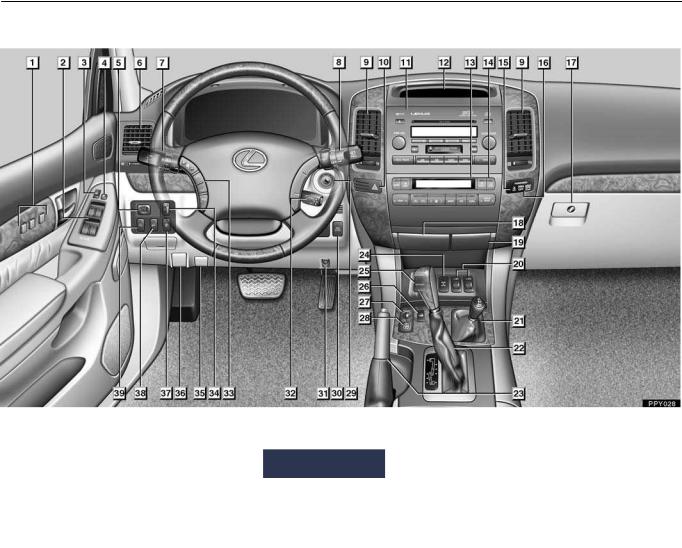
PICTORIAL INDEX
INSTRUMENT PANEL (vehicles without navigation system)
XI
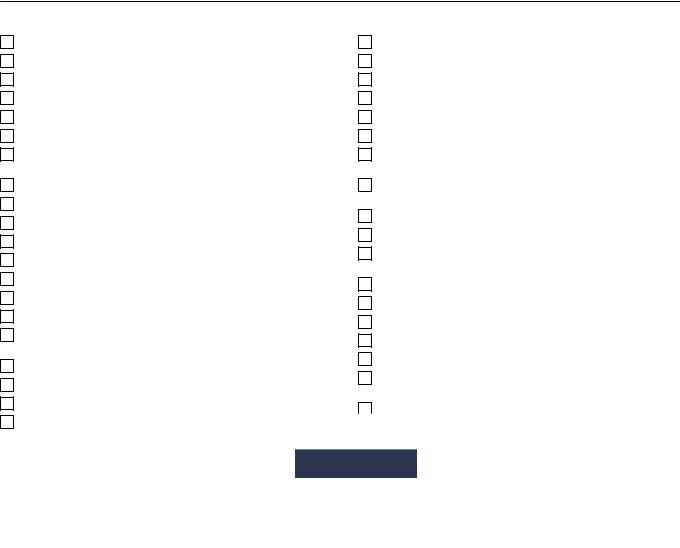
PICTORIAL INDEX
1
2
3
4
5
6
7
8
9
10
11
12
13
14
15
16
17
18
19
20
Page Driving position memory switches . . . . . . . . . . . 198 Power window switches . . . . . . . . . . . . . . . . . . . . . . . 40 Power door lock switch . . . . . . . . . . . . . . . . . . . . . . . 22 Window lock switch . . . . . . . . . . . . . . . . . . . . . . . . . . . 41 Power rear view mirror control switches . . . . . . 204 Side vents . . . . . . . . . . . . . . . . . . . . . . . . . . . . . . . . . . 225
Headlight, turn signal and
fog light switches . . . . . . . . . . . . . . . . . . . . . . 30, 32, 33 Wiper and washer switches . . . . . . . . . . . . . . . . . . . . 33 Center vents . . . . . . . . . . . . . . . . . . . . . . . . . . . . . . . . 225 Emergency flasher switch . . . . . . . . . . . . . . . . . . . . . 43 Audio system . . . . . . . . . . . . . . . . . . . . . . . . . . . . . . . 232 Multi−information display . . . . . . . . . . . . . . . . . . . . . . 63 Automatic air conditioning controls . . . . . . . . . . 214 Rear window defogger switch . . . . . . . . . . . . . . . . . . 38 Front passenger’s seat belt reminder light . . . . . . 55
“AIRBAG ON” and “AIRBAG OFF”
indicator lights . . . . . . . . . . . . . . . . . . . . . . . . . . . . . 169 Glove box . . . . . . . . . . . . . . . . . . . . . . . . . . . . . . . . . . . . 83 Ashtray . . . . . . . . . . . . . . . . . . . . . . . . . . . . . . . . . . . . . . 80 Cigarette lighter . . . . . . . . . . . . . . . . . . . . . . . . . . . . . . 80 Seat heater switches . . . . . . . . . . . . . . . .
For detailed
Page
21 Four−wheel drive control lever . . . . . . . . . . . . . . . 356
22 Automatic transmission selector lever . . . . . . . . 349
23 Parking brake lever . . . . . . . . . . . . . . . . . . . . . . . . . 347
24 Center differential lock switch . . . . . . . . . . . . . . . 356
25 Power outlet (12 VDC) . . . . . . . . . . . . . . . . . . . . . . . . . 81
26 Downhill assist control switch . . . . . . . . . . . . . . . 377
27 Electronic modulated suspension
control switch . . . . . . . . . . . . . . . . . . . . . . . . . . . . . . 371
28 Rear height control air suspension
switches . . . . . . . . . . . . . . . . . . . . . . . . . . . . . . . . . . . 366
29 Ignition switch . . . . . . . . . . . . . . . . . . . . . . . . . . . . . . 345
30 “2nd STRT” (second start) switch . . . . . . . . . . . . 355
31 Tire pressure warning system
selector switch . . . . . . . . . . . . . . . . . . . . . . . . . . . . . 393
32 Cruise control switch . . . . . . . . . . . . . . . . . . . . . . . 362
33 Audio remote control switches . . . . . . . . . . . . . . . 250
34 Instrument panel light control dial . . . . . . . . . . . . . . 74
35 Hood lock release lever . . . . . . . . . . . . . . . . . . . . . 100
36 Fuel filler door opener . . . . . . . . . . . . . . . . . . . . . . . 101
37 “RSCA OFF” (roll sensing of curtain
shield airbags off) switch . . . . . . . . . . . . . . . . . . . . 174
38 Outside rear view mirror defogger switch . . . . . . . 39 (115 VAC) main switch . . . . . . . . . . . . 82
each Section.
XII
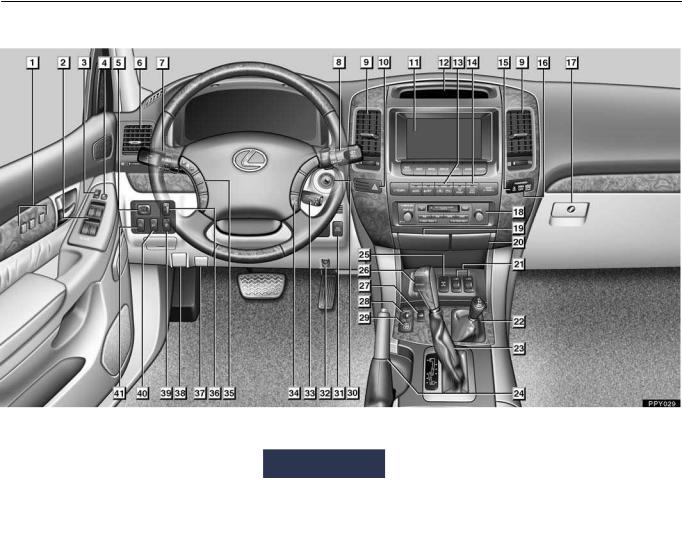
PICTORIAL INDEX
INSTRUMENT PANEL (vehicles with navigation system)
XIII

PICTORIAL INDEX
Page
1 Driving position memory switches . . . . . . . . . . . 198 2 Power window switches . . . . . . . . . . . . . . . . . . . . . . . 40 3 Power door lock switch . . . . . . . . . . . . . . . . . . . . . . . 22 4 Window lock switch . . . . . . . . . . . . . . . . . . . . . . . . . . . 41 5 Power rear view mirror control switches . . . . . . 204 6 Side vents . . . . . . . . . . . . . . . . . . . . . . . . . . . . . . . . . . 225
7Headlight, turn signal and
fog light switches . . . . . . . . . . . . . . . . . . . . . . 30, 32, 33 8 Wiper and washer switches . . . . . . . . . . . . . . . . . . . . 33 9 Center vents . . . . . . . . . . . . . . . . . . . . . . . . . . . . . . . . 225 10 Emergency flasher switch . . . . . . . . . . . . . . . . . . . . . 43
11Rear view monitor/navigation system display including air conditioning controls and audio system
|
(For the navigation system, see the separate |
||
|
“Navigation System Owner’s Manual”.) . . . . . . . |
358 |
|
|
12 |
Multi−information display . . . . . . . . . . . . . . . . . . . . . |
. 63 |
|
13 |
Automatic air conditioning controls |
|
|
. . . . . . . . . See the separate |
||
|
“Navigation System Owner’s Manual”. |
||
|
14 |
Rear window defogger switch . . . . . . . . . . . . . . . . . |
. 38 |
|
15 |
Front passenger’s seat belt reminder light . . . . . |
. 55 |
|
16 |
“AIRBAG ON” and “AIRBAG OFF” |
|
|
indicator lights . . . . . . . . . . . . . . . . . . . . . . . . . . . . . |
169 |
|
|
17 |
Glove box . . . . . . . . . . . . . . . . . . . . . . . . . . . . . . . . . . . |
. 83 |
|
18 |
Audio system |
|
|
. . . . . . . . . See the separate |
||
|
“Navigation System Owner’s |
||
|
19 |
Ashtray . . . . . . . . . . . . . . . . . . . . . . . . . . . . |
|
|
For detailed |
|
Page |
||
|
20 |
Cigarette lighter . . . . . . . . . . . . . . . . . . . . . . . . . . . . |
. . 80 |
|
21 |
Seat heater switches . . . . . . . . . . . . . . . . . . . . . . . . |
. . 44 |
|
22 |
Four−wheel drive control lever . . . . . . . . . . . . . . . |
356 |
|
23 |
Automatic transmission selector lever . . . . . . . . |
349 |
|
24 |
Parking brake lever . . . . . . . . . . . . . . . . . . . . . . . . . |
347 |
|
25 |
Center differential lock switch . . . . . . . . . . . . . . . |
356 |
|
26 |
Power outlet (12 VDC) . . . . . . . . . . . . . . . . . . . . . . . |
. . 81 |
|
27 |
Downhill assist control switch . . . . . . . . . . . . . . . |
377 |
|
28 |
Electronic modulated suspension |
|
|
control switch . . . . . . . . . . . . . . . . . . . . . . . . . . . . . . |
371 |
|
|
29 |
Rear height control air suspension |
|
|
switches . . . . . . . . . . . . . . . . . . . . . . . . . . . . . . . . . . . |
366 |
|
|
30 |
Ignition switch . . . . . . . . . . . . . . . . . . . . . . . . . . . . . . |
345 |
|
31 |
“2nd STRT” (second start) switch . . . . . . . . . . . . |
355 |
|
32 |
Tire pressure warning system |
|
|
selector switch . . . . . . . . . . . . . . . . . . . . . . . . . . . . . |
393 |
|
|
33 |
Cruise control switch . . . . . . . . . . . . . . . . . . . . . . . |
362 |
|
34 |
Speech command switch |
|
|
. . . . . . . . . See the separate |
||
|
“Navigation System Owner’s Manual”. |
||
|
35 |
Audio remote control switches . . . . . . . . . . . . . . . |
250 |
|
36 |
Instrument panel light control dial . . . . . . . . . . . . |
. . 74 |
|
37 |
Hood lock release lever . . . . . . . . . . . . . . . . . . . . . |
100 |
|
38 |
Fuel filler door opener . . . . . . . . . . . . . . . . . . . . . . . |
101 |
|
39 |
“RSCA OFF” (roll sensing of curtain |
|
|
shield airbags off) switch . . . . . . . . . . . . . . . . . . . . |
174 |
|
|
view mirror defogger switch . . . . . |
. . 39 |
|
|
(115 VAC) main switch . . . . . . . . . . |
. . 82 |
|
|
each Section. |
XIV
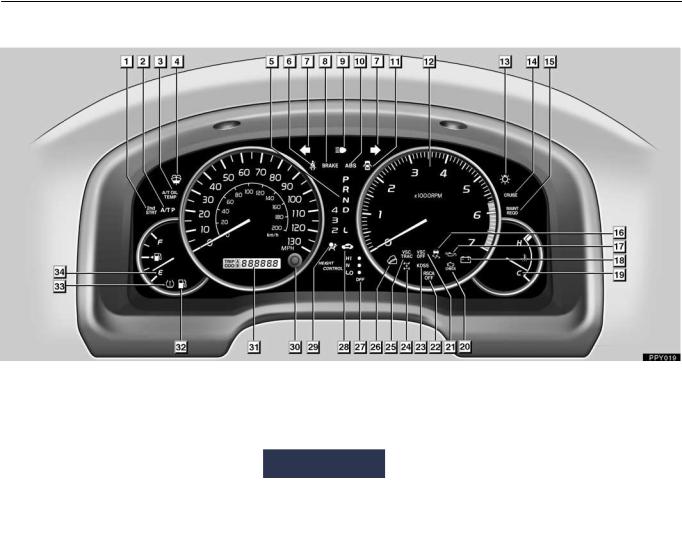
PICTORIAL INDEX
INSTRUMENT CLUSTER (vehicles sold in U.S.A.)
XV

PICTORIAL INDEX
Page
1Automatic transmission second start
|
indicator light . . . . . . . . . . . . . . . . . . . . . . . . . . . . . . |
355 |
|
2 Unengaged “Park” warning light . . . . . . . . . . . . . . |
. 58 |
3Automatic transmission fluid temperature
warning light . . . . . . . . . . . . . . . . . . . . . . . . . . . . . . . . . 58
4 Low washer fluid warning light . . . . . . . . . . . . . . . . . 61
5 Automatic transmission indicator lights . . . . . . 349
6 Driver’s seat belt reminder light . . . . . . . . . . . . . . . . 54
7 Turn signal indicator light . . . . . . . . . . . . . . . . . . . . . 32
8 Brake system warning light . . . . . . . . . . . . . . . . . . . . 53
9 Headlight high beam indicator light . . . . . . . . . . . . 32
10 Anti−lock brake system warning light . . . . . . . . . . . 57
11 Open door warning light . . . . . . . . . . . . . . . . . . . . . . . 58
12 Tachometer . . . . . . . . . . . . . . . . . . . . . . . . . . . . . . . . . . 50
13 Headlight indicator light . . . . . . . . . . . . . . . . . . . . . . . 30
14 Cruise control indicator light . . . . . . . . . . . . . . . . 362
15 Engine oil replacement reminder light . . . . . . . . . . 60
16 Slip indicator light . . . . . . . . . . . . . 373, 375, 378, 381
17 Low engine oil pressure warning light . . . . . . . . . . 60
18 Charging system warning light . . . . . . . . . . . . . . . . . 59
For detailed
Page
19 Engine coolant temperature gauge . . . . . . . . . . . . . 49
20 Malfunction indicator lamp . . . . . . . . . . . . . . . . . . . . 56
21 Vehicle stability control system off
indicator light . . . . . . . . . . . . . . . . . . . . . . . . . . . . . . 376
22 Roll sensing of curtain shield airbags off
indicator light . . . . . . . . . . . . . . . . . . . . . . . . . . . . . . 174
23 Kinetic dynamic suspension system
warning light . . . . . . . . . . . . . . . . . . . . . . . . . . . . . . . . . 59
24 Center differential lock indicator light . . . . . . . . 356
25 Vehicle stability control system and active
traction control system warning light . . . . . . . . . . . 59
26 Downhill assist control system
indicator light . . . . . . . . . . . . . . . . . . . . . . . . . . . . . . 378
27 Height control indicator lights . . . . . . . . . . . . . . . 370
28 Security indicator light . . . . . . . . . . . . . . . . . . . . 12, 27
29 SRS warning light . . . . . . . . . . . . . . . . . . . . . . . . . . . . . 55
30 Trip meter reset knob . . . . . . . . . . . . . . . . . . . . . . . . . 50
31 Odometer and trip meter . . . . . . . . . . . . . . . . . . . . . . 50
32 Low fuel level warning light . . . . . . . . . . . . . . . . . . . . 61
33 Low tire pressure warning light . . . . . . . . . . . . . . . . 61
34 Fuel gauge . . . . . . . . . . . . . . . . . . . . . . . . . . . . . . . . . . . 48
each Section.
XVI
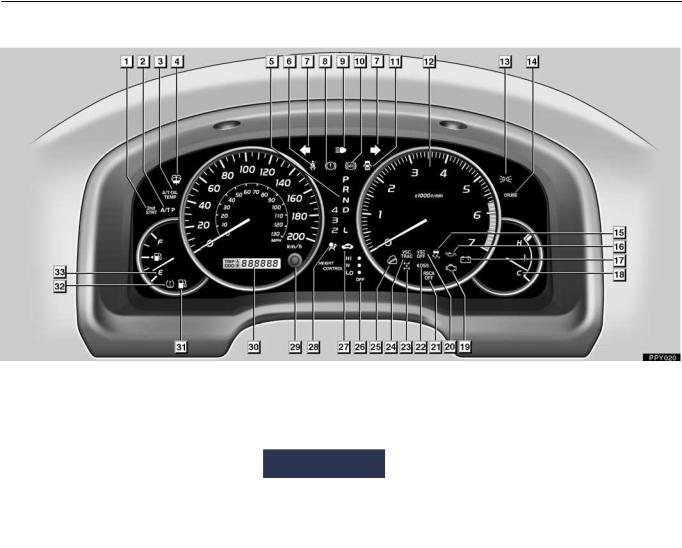
PICTORIAL INDEX
INSTRUMENT CLUSTER (vehicles sold in Canada)
XVII
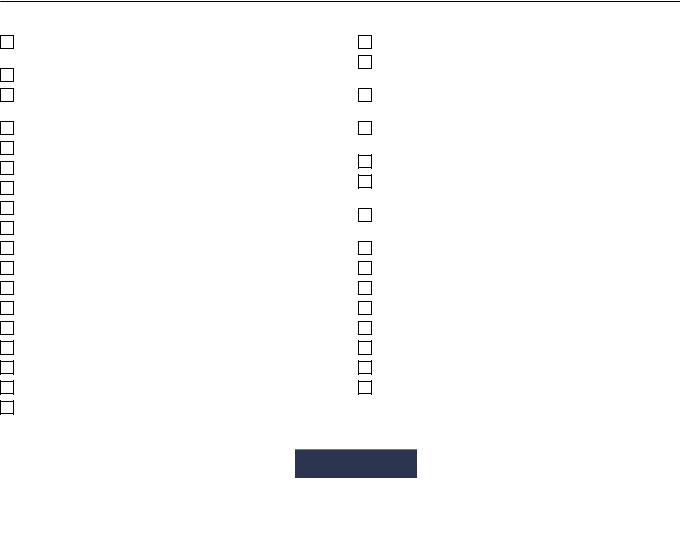
PICTORIAL INDEX
Page
1Automatic transmission second start
|
indicator light . . . . . . . . . . . . . . . . . . . . . . . . . . . . . . |
355 |
|
2 Unengaged “Park” warning light . . . . . . . . . . . . . . |
. 58 |
3Automatic transmission fluid temperature
warning light . . . . . . . . . . . . . . . . . . . . . . . . . . . . . . . . . 58
4 Low washer fluid warning light . . . . . . . . . . . . . . . . . 61
5 Automatic transmission indicator lights . . . . . . 349
6 Driver’s seat belt reminder light . . . . . . . . . . . . . . . . 54
7 Turn signal indicator light . . . . . . . . . . . . . . . . . . . . . 32
8 Brake system warning light . . . . . . . . . . . . . . . . . . . . 53
9 Headlight high beam indicator light . . . . . . . . . . . . 32
10 Anti−lock brake system warning light . . . . . . . . . . . 57
11 Open door warning light . . . . . . . . . . . . . . . . . . . . . . . 58
12 Tachometer . . . . . . . . . . . . . . . . . . . . . . . . . . . . . . . . . . 50
13 Tail light indicator light . . . . . . . . . . . . . . . . . . . . . . . . 30
14 Cruise control indicator light . . . . . . . . . . . . . . . . 362
15 Slip indicator light . . . . . . . . . . . . . 373, 375, 378, 381
16 Low engine oil pressure warning light . . . . . . . . . . 60
17 Charging system warning light . . . . . . . . . . . . . . . . . 59
18 Engine coolant temperature gauge . . . . . . . . . . . . . 49
For detailed
Page
19 Malfunction indicator lamp . . . . . . . . . . . . . . . . . . . . 56
20 Vehicle stability control system off
indicator light . . . . . . . . . . . . . . . . . . . . . . . . . . . . . . 376
21 Roll sensing of curtain shield airbags off
indicator light . . . . . . . . . . . . . . . . . . . . . . . . . . . . . . 174
22 Kinetic dynamic suspension system
warning light . . . . . . . . . . . . . . . . . . . . . . . . . . . . . . . . . 59
23 Center differential lock indicator light . . . . . . . . 356
24 Vehicle stability control system and active
traction control system warning light . . . . . . . . . . . 59
25 Downhill assist control system
indicator light . . . . . . . . . . . . . . . . . . . . . . . . . . . . . . 378
26 Height control indicator lights . . . . . . . . . . . . . . . 370
27 Security indicator light . . . . . . . . . . . . . . . . . . . . 12, 27
28 SRS warning light . . . . . . . . . . . . . . . . . . . . . . . . . . . . . 55
29 Trip meter reset knob . . . . . . . . . . . . . . . . . . . . . . . . . 50
30 Odometer and trip meter . . . . . . . . . . . . . . . . . . . . . . 50
31 Low fuel level warning light . . . . . . . . . . . . . . . . . . . . 61
32 Low tire pressure warning light . . . . . . . . . . . . . . . . 61
33 Fuel gauge . . . . . . . . . . . . . . . . . . . . . . . . . . . . . . . . . . . 48
each Section.
XVIII
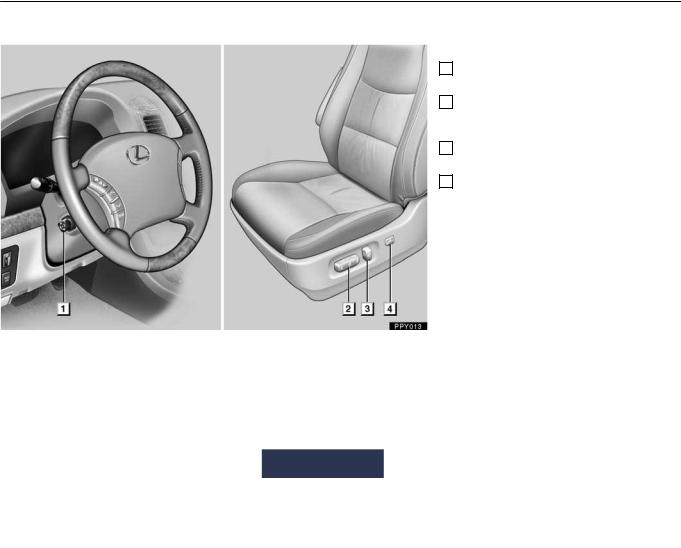
PICTORIAL INDEX
SEAT AND STEERING WHEEL
Page
1 Tilt and telescopic steering
control switch . . . . . . . . . . . . . . . . . . 202
2 Seat position, seat cushion angle and height control
switch . . . . . . . . . . . . . . . . . . . . . 115, 116
3 Seatback angle control
switch . . . . . . . . . . . . . . . . . . . . . . . . . 115
4 Lumbar support control
switch . . . . . . . . . . . . . . . . . . . . . . . . . 116
For detailed information, refer to the description given in each Section.
XIX
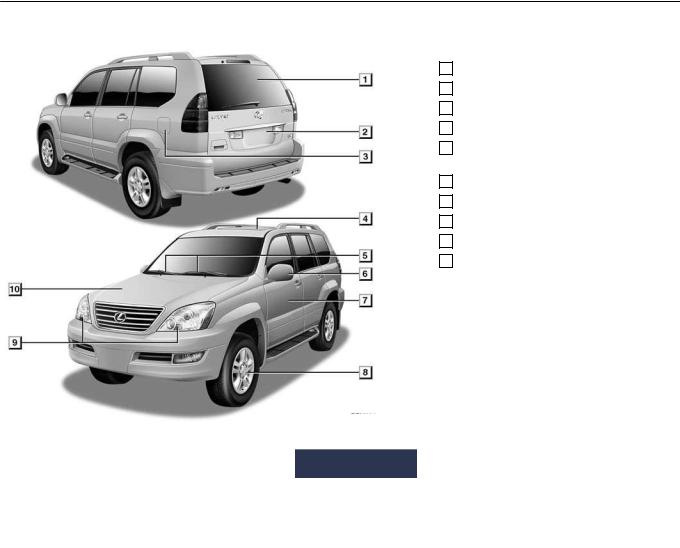
PICTORIAL INDEX
EXTERIOR VIEW
Page Rear window defogger . . . . . . . . . . . 38 Back door . . . . . . . . . . . . . . . . . . . . . . 25 Fuel filler door . . . . . . . . . . . . . . . . . 101 Moon roof . . . . . . . . . . . . . . . . . . . . . 103
Windshield wiper and
washer . . . . . . . . . . . . . . . . . . . . 33, 558 Outside rear view mirror . . . . . . . . 203 Side door . . . . . . . . . . . . . . . . . . . . . . . 20 Tire and wheel . . . . . . . . . . . . . . . . . 523 Headlights . . . . . . . . . . . . . . . . . 30, 559 Hood . . . . . . . . . . . . . . . . . . . . . . . . . . 100
For detailed information, refer to the description given in each Section.
XX

PICTORIAL INDEX
XXI

BASIC OPERATION
QUICK REFERENCE
Quick reference
Driver’s seat . . . . . . . . . . . . . . . . . . . . . . . . . . . . . . . . . . . . . . . . . . . . . . 2 Steering wheel . . . . . . . . . . . . . . . . . . . . . . . . . . . . . . . . . . . . . . . . . . . . 2 Automatic transmission . . . . . . . . . . . . . . . . . . . . . . . . . . . . . . . . . . . . . 3 Headlight and turn signal switch . . . . . . . . . . . . . . . . . . . . . . . . . . . . . 4 Wiper and washer switch . . . . . . . . . . . . . . . . . . . . . . . . . . . . . . . . . . . 5
1
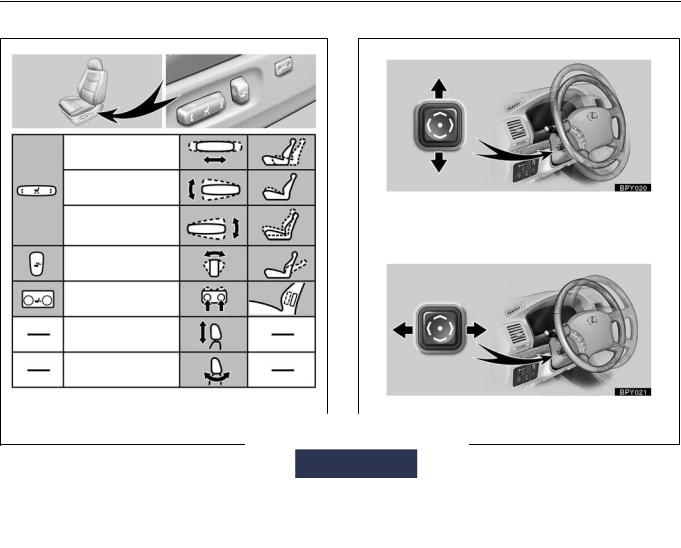
QUICK REFERENCE
1. DRIVER’S SEAT
Seat position
Seat cushion angle
Seat cushion height
Seatback angle
Lumbar support
Head restraint height
Head restraint angle
2. STEERING WHEEL
D TILT STEERING WHEEL
To tilt the steering wheel up or down to the desired angle, push the control switch in the required direction and release the button when the steering wheel reaches the desired angle.
D TELESCOPIC STEERING WHEEL
To move the steering wheel to the desired position, push the from you or pull it toward you until the
the desired position.
2
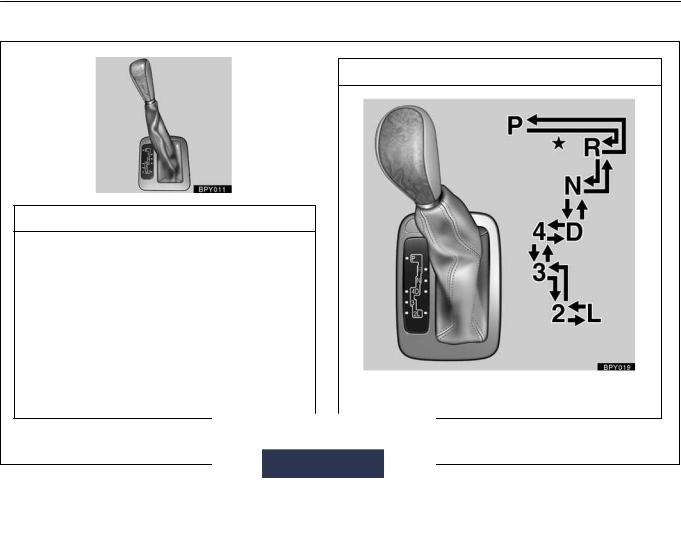
QUICK REFERENCE
3. AUTOMATIC TRANSMISSION
SELECTOR LEVER POSITION
P:Parking, engine starting and key removal position
R:Reverse position
N:Neutral position
D:Normal driving position (shifting into overdrive possible)
4:Position for engine braking (shifting into overdrive not possible)
3, 2: Position for more powerful engine braking
L: Position for maximum engine braking
NOTE: When the cruise control is because the cruise control is not
OPERATION OF SELECTOR LEVER
KShift while pressing the brake pedal. (Ignition switch must be in the “ON” position.)
to “4”, engine braking will not be enabled vehicle speed, see page 365.
3
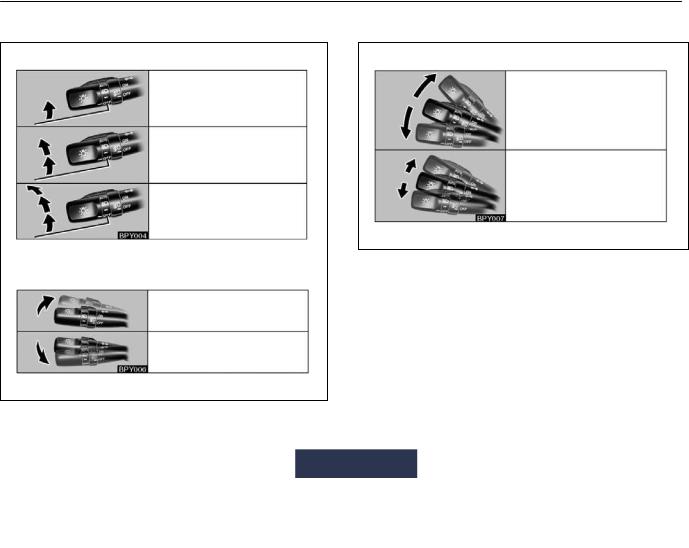
QUICK REFERENCE
4. HEADLIGHT AND TURN SIGNAL SWITCH
D HEADLIGHT SWITCH
Parking, tail, license plate, side marker and instrument panel lights turn on.
Headlights also turn on.
Automatic light control
D TURN SIGNAL SWITCH
Right or left turn
Lane change (right or left)
High beam
Headlight flasher
4
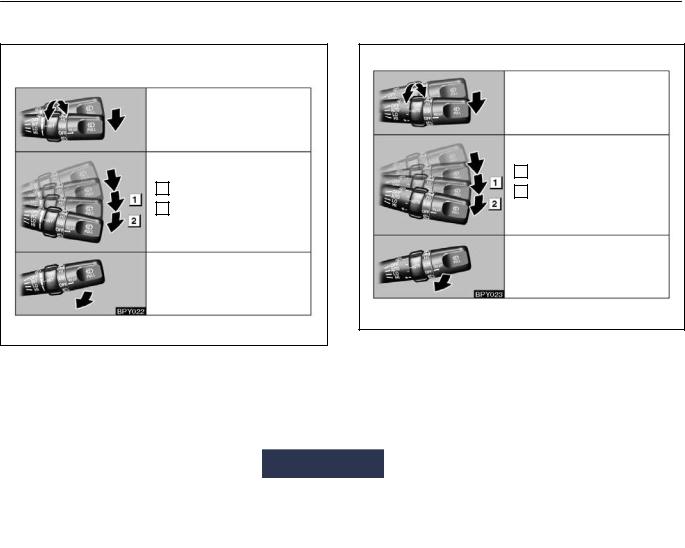
QUICK REFERENCE
5. WIPER AND WASHER SWITCH
D Front
Variable intermittent windshield wipers
Variable intermittent operation
1 Low speed operation
2 High speed operation
Washer on
Rain−sensing windshield wipers
Automatic operation
1Low speed operation
2 High speed operation
Washer on
5

QUICK REFERENCE
D Rear
3 Wiper on
(intermittent operation)
4 Wiper on
(normal operation)
5 Washer also on
6 Washer on
6

SECTION 1 – 1
INSTRUMENTS AND CONTROLS
Keys and doors
Keys . . . . . . . . . . . . . . . . . . . . . . . . . . . . . . . . . . . . . . . . . . . . . . . . . . . . . 8 Engine immobilizer system . . . . . . . . . . . . . . . . . . . . . . . . . . . . . . . . . 12 Wireless remote control . . . . . . . . . . . . . . . . . . . . . . . . . . . . . . . . . . . . 13 Side doors . . . . . . . . . . . . . . . . . . . . . . . . . . . . . . . . . . . . . . . . . . . . . . . 20 Back door . . . . . . . . . . . . . . . . . . . . . . . . . . . . . . . . . . . . . . . . . . . . . . . . 25 Theft deterrent system . . . . . . . . . . . . . . . . . . . . . . . . . . . . . . . . . . . . . 26
7

KEYS AND DOORS
KEYS
Since the side doors and back door can be locked without a key, you should always carry a spare master key in case you accidentally lock your keys inside the vehicle.
If you should lose your keys or if you need additional keys, duplicates can be made by a Lexus dealer using the key number.
We recommend writing down the key number and storing it in a safe place.
1Master keys (black) — These keys work in every lock.
For your Lexus dealer to make a new key with a built−in transponder chip, your dealer will need one of them.
2Valet key (gray) — This key will not open the glove box.
3Key number plate — Keep the plate in a safe place such as your wallet, not in the vehicle.
A transponder chip for the engine immobilizer system has been placed in the head of the master and valet keys. These chips are required for the system to function correctly, so be careful not to lose these keys. If you make your own duplicate key, you will not be able to cancel the system or start the engine.
To protect items locked in the glove box when using valet parking, leave the valet key with the attendant
8

KEYS AND DOORS
|
Flat key |
Starting the engine using a flat key |
|||
As a transponder chip is built in its key case, you can start the engine with this key.
The flat key works in every lock.
A transponder chip for the engine immobilizer system has been placed in the key case of the flat key. This chip is required for the system to function correctly, so be careful not to lose this key. If you make your own duplicate key, you will not be able to cancel the system or start the engine.
Insert your key plate in its key case as shown. We recommend that you always carry this with you for emergency use. Do not leave it in your vehicle.
1.Remove the key plate from the key case.
2.Insert the key plate into the ignition switch. The indicator light keeps flashing.
3.Bring the key case closer to the ignition switch within 10 seconds as indicated by the arrow head. The indicator light goes out. This means the engine immobilizer system is automatically canceled. (For details, see “Engine immobilizer system” on page 12.) You can put the key case away then. You cannot cancel the engine immobilizer system if 10 seconds have past after you inserted the key plate. You need to remove the key plate from the ignition switch and try it again from the step 2.
9

KEYS AND DOORS
4. Start the engine within 60 seconds after the security indicator light goes out. You cannot start the engine if 60 seconds have passed after the security indicator went off. You need to remove the key plate from the ignition switch and try it again from the step 2.
NOTICE
DDo not let the key case become bent as the key plate may fall out or become bent also.
DThe flat key is designed for emergency use only.
When using a key containing a transponder chip, observe the following precautions:
D When starting the engine, do not use the key with a key ring resting on the key grip and do not press the key ring against the key grip. Doing so may prevent the engine from starting, or may cause the engine to stop soon after it starts.
10

KEYS AND DOORS
D When starting the engine, do not use the key in proximity with other transponder keys (including the flat key and keys of other vehicles), and do not press other key plates against the key grip. Doing so may prevent the engine from starting, or may cause the engine to stop soon after it starts. If this happens, remove the key once and then insert it again after removing other transponder keys (including the flat key and keys of other vehicles) from the ring or while gripping or covering them with your hand to start the engine.
DDo not bend the key grip or flat key.
DDo not cover the key grip or flat key with any material that cuts off electromagnetic waves.
DDo not knock the key or flat key hard against other objects.
DDo not leave the key or flat key exposed to high temperatures for a long period, such as on the dashboard or hood under direct sunlight.
DDo not put the key or flat key in water or wash it in an ultrasonic washer.
DDo not use the key or flat key with electromagnetic materials.
11

KEYS AND DOORS
ENGINE IMMOBILIZER SYSTEM
The engine immobilizer system is a theft prevention system. When you insert the key in the ignition switch, the transponder chip in the key’s head transmits an electronic code to the vehicle. The engine will start only when the electronic code in the chip corresponds to the registered ID code for the vehicle.
The system is automatically set when the key is removed from the ignition switch. At this time, the security indicator light flashes. When you insert the key in the ignition switch, the security indicator light goes out and the system is canceled automatically, which enables the engine to start.
The transponder chip of the flat key is in its key case. You can cancel the engine immobilizer system using the flat key. (For details, see “Flat key” on page 9.)
For your Lexus dealer to make you a new key with built−in transponder chip, your dealer will need your key number and master key. However, there is a limit to the number of additional keys your Lexus dealer can make for you.
If you make your own duplicate key, you will not be able to cancel the system or start the engine.
For vehicles sold in U.S.A.
FCC ID: MOZRI−20BTY
MADE IN JAPAN
This device complies with Part 15 of the FCC Rules. Operation is subject to the following two conditions:
(1) This device may not cause harmful interference, and (2) this device must accept any interference received, including interference that may cause undesired operation.
12

KEYS AND DOORS

Changes or modifications not expressly approved by the party responsible for compliance could void the user’s authority to operate the equipment.
For vehicles sold in Canada
This device complies with RSS−210 of Industry Canada.
Operation is subject to the following two conditions:
(1) this device may not cause interference, and (2) this device must accept any interference, including interference that may cause undesired operation of the device.
WIRELESS REMOTE CONTROL*
1 Locking the doors
2 Unlocking the doors
3 Indicator light
4 Sounding an alarm
NOTE:
* This feature can be set inoperative as vehicle theft deterrent measure in case of the loss of the wireless remote control key.
Ask your Lexus dealer for details.
When you operate any button on the key, push it slowly and surely. At this time, the indicator light on the key grip flashes once.
13

KEYS AND DOORS
The operational range of the wireless remote control is approximately 1 meter (3 ft.). The effective range may vary with different conditions. To activate the wireless remote control without fail, do it approximately 1 meter (3 ft.) from your Lexus.
In the following cases, the battery in the key may be discharged. If this is the case, replace it using a special screwdriver.
DThe remote control does not work.
DThe operational range of wireless remote control becomes extremely short.
DThe indicator light on the key is dimmed or does not come on.
For the replacement of the battery, see “Replacing the battery” on page 18. You can also have the battery of the key replaced by your Lexus dealer.
If you lose the wireless key, contact your Lexus dealer as soon as possible to avoid the possibility of theft, or an accident.
You can use up to 4 wireless remote control keys for the same vehicle. Contact your Lexus dealer for detailed information.
The wireless remote control key is an electronic component. Observe the following instructions in order not to cause damage to the key.
DDo not leave the wireless remote control key in places where the temperature becomes high such as on the dashboard.
DDo not disassemble it.
DAvoid knocking it hard against other objects or dropping it.
DAvoid putting it in water.
14

KEYS AND DOORS
Locking/Unlocking the doors
When you push the “LOCK” button on the key briefly, all the side doors and back door can be locked from outside the vehicle.
At this time, you can hear one beep* and the turn signal lights flash.** However, when you push the “LOCK” button with any door not closed securely, the buzzer sounds for 10 seconds.***
To stop the buzzer, close all the side doors and back door securely or push the “UNLOCK” button. If the key is in the ignition switch, locking cannot be done.
Make sure all the doors are locked when you leave the vehicle. Push the “LOCK” button once again. If they were already locked, the turn signal lights will flash.
NOTE:
* The beep volume can be changed.
**The turn signal lights can be set not to flash.
***The buzzer can be set not to sound if a door is not closed securely.
Ask your Lexus dealer for details.
When you push the “UNLOCK” button, the driver’s door is unlocked. Pushing that button once again within 3 seconds from the first push, all other side doors and back door are also unlocked.*
NOTE:
* The 2−step unlocking function can be changed. Ask your Lexus dealer for details.
At this time, you can hear two beeps* and the turn signal lights flash twice.** Together with the activation of unlocking, the personal lights and center interior light come on for 15 seconds if the personal light switch and center interior light switch is in the “DOOR” position and the running board lights come on for 15 seconds.*** However, this function does not work when the ignition key is in the “ON” position. For further information, see “Illuminated entry system” on page 78.
You have 30 seconds to open a door after using the wireless remote unlock feature.**** If a door is not opened by then, all the doors will be automatically locked again.
Even if the “LOCK” or “UNLOCK” button is kept pressed in, the locking or unlocking operation is not repeated. Release the button and then push again.
15

KEYS AND DOORS
NOTE:
* The beep volume can be changed.
**The turn signal lights can be set not to flash.
***The personal lights, center interior light and running board lights can be set not to come on or the duration of lighting can be changed.
****The time before automatic re−locking can be changed. Ask your Lexus dealer for details.
Sounding an alarm*
When you push the “PANIC” button for about 1 second, an alarm sounds to deter any person trying to break into or damage your vehicle.
If you want to stop the alarm, push any button.
This function does not work when the ignition key is in the “ON” position.
NOTE:
* The alarm can be set not to sound. Ask your Lexus dealer for details.
16

KEYS AND DOORS
Operating the windows and moon roof
The windows and moon roof can be opened using a wireless key from outside the vehicle.*
NOTE:
* The windows and moon roof can be set inoperative. Ask your Lexus dealer for details.
Push the “UNLOCK” button until the windows and moon roof start to move. A beep sounds just before opening. When you release the button, the windows and moon roof stop opening.
For vehicles sold in U.S.A.
This device complies with Part 15 of the FCC Rules. Operation is subject to the following two conditions:
(1) This device may not cause harmful interference, and (2) this device must accept any interference received, including interference that may cause undesired operation.
NOTICE:
This equipment has been tested and found to comply with the limits for a Class B digital device, pursuant to Part 15 of the FCC Rules. These limits are designed to provide reasonable protection against harmful interference in a residential installation. This equipment generates, uses and can radiate radio frequency energy and, if not installed and used in accordance with the instructions, may cause harmful interference to radio communications. However, there is no guarantee that interference will not occur in a particular installation. If this equipment does cause harmful interference to radio or television reception, which can be determined by turning the equipment off and on, the user is encouraged to try to correct the interference by one or more of the following measures:
DReorient or relocate the receiving antenna.
DIncrease the separation between the equipment receiver.
17

KEYS AND DOORS
DConnect the equipment into an outlet on a circuit different from that to which the receiver is connected.
DConsult the dealer or an experienced radio/TV technician for help.
FCC WARNING:
Changes or modifications not expressly approved by the party responsible for compliance could void the user’s authority to operate the equipment.
For vehicles sold in Canada
Operation is subject to the following two conditions:
(1) this device may not cause interference, and (2) this device must accept any interference, including interference that may cause undesired operation of the device.
Replacing the battery
When you replace the battery, prepare a lithium battery CR1616 or equivalent and a special screwdriver.

Special care should be taken to prevent small children from swallowing the removed battery or components.
NOTICE
DWhen replacing the battery, be careful not to lose the components, screws and O−ring.
DReplace only with the same or equivalent type recommended by a Lexus dealer.
DDispose of used batteries according to the local laws.
18

KEYS AND DOORS
1. Remove the screw, and then the cover while pushing it in the arrow direction.
2. Remove the module from the key frame.
3.Remove the 2 screws to take out the lid of the module.
4.Take out the discharged battery and put in a new battery with the positive side up.
19

KEYS AND DOORS
NOTICE
DMake sure the positive side and negative side of the battery are faced correctly.
DDo not replace the battery with wet hands. Water may cause unexpected rust.
DDo not touch or move any components inside the transmitter, or it may interfere with proper operation.
DBe careful not to bend the electrode when inserting the battery and that dust or oils do not adhere to the inside the module.
DTake care not to lose the screws and O−ring.
5.Install the lid with the 2 screws.
NOTICE
Take care not to damage or bend the O−ring when installing.
6.Install the module into the key frame and secure the cover with the screw.
7.When pushing any switch on the wireless key, make sure the indicator light comes on.
SIDE DOORS
Locking with key
Turn the key towards the front of the vehicle to lock and towards the back to unlock.
All the side doors and back door lock and unlock simultaneously with the driver’s door. In the driver’s door lock, turning the key once will unlock the driver’s door and twice in succession will unlock all the side doors and back door simultaneously.*
NOTE:
* The 2−step unlocking function can be changed. Ask your Lexus dealer for details.
20

KEYS AND DOORS
Together with the activation of unlocking, the personal lights and center interior light come on for 15 seconds if the personal light and center interior light switches are in the “DOOR” positions, and the running board lights come on for about 15 seconds. However, this function does not work when the ignition key is in the “ON” position. For further information, see “Illuminated entry system” on page 78.
Locking with inside lock button
Push in the lock button to lock and unlock the door.
The front doors can be opened by pulling the inside handles even if the lock buttons are in the locked position.

Do not pull the inside handle of the front doors while driving. The doors will open and an accident may occur. Lexus strongly recommends that all children be placed in the rear seat of the vehicle.
Closing the door with the lock button pushed in will also lock the door. Be careful not to lock your keys in the vehicle. Doors cannot be locked when either front door is open and the key is in the ignition.

Before driving, make sure the doors are closed and locked, especially when small children are in the vehicle. Along with the proper use of seat belts, locking the doors helps prevent the driver and passengers from being thrown out from the vehicle in an accident. It also helps prevent the doors from being opened unintentionally.
21

KEYS AND DOORS
Locking with power door lock switch
To lock all the side doors and back door simultaneously, push the power door lock switch down on the front side. Pushing down on the rear side will unlock them.
The same switch is also located on the front passenger’s side.
If you do any of the following, no door can be unlocked with the power door lock switch.
DLock all the doors with the key or wireless remote control when all the doors are closed.
DOpen the driver’s door or front passenger’s door and move the inside lock buttons of both front doors to the lock position, then close the front doors.
The power door lock switch can be reset in the following ways.
DTurn the ignition key to the “ON” position.
DUnlock all the side doors and back door with the key or wireless remote control.
DUnlock the driver’s door or front passenger’s door with the inside lock button, and then unlock all the doors with the power door lock switch.
Automatic door locking and unlocking functions
AUTOMATIC DOOR LOCKING
You can select the following functions:
DLocking linked with the shift position
All doors are automatically locked when the selector lever is moved out of “P” position.
DLocking linked with vehicle speed
All doors are automatically locked when the vehicle speed goes above about 20 km/h (12 mph).
You can set or cancel the automatic door locking functions:
Be sure to apply the parking brake when performing the following operations.
22

KEYS AND DOORS
To select the locking linked with the shift position:
1.Close all doors and turn the ignition switch to the “ON” position.
2.Shift the selector lever to the “P” position.
3.Within 10 seconds of turning the ignition switch to the “ON” position, press and hold the driver’s side power door lock switch in the lock position for 5 seconds and then release.
The doors will be locked and unlocked to indicate that the function is set.
To cancel the function, do the above operation again.
To select the locking linked with the vehicle speed:
1.Close all doors and turn the ignition switch to the “ON” position.
2.Shift the selector lever from “P” to the ”N” position.
3.Within 10 seconds of turning the ignition switch to the “ON” position, press and hold the driver’s side power door lock switch in the lock position for 5 seconds and then release.
The doors will be locked and unlocked to indicate that the function is set.
To cancel the function, do the above operation again.
AUTOMATIC DOOR UNLOCKING
You can select the following functions:
DUnlocking linked with the shift position
All doors are automatically unlocked when the selector lever is moved to “P” position.
DUnlocking linked with the ignition switch
All doors are automatically unlocked when the driver’s door is opened within 10 seconds after the ignition switch is turned to the “ACC” or “LOCK” position, or the key is removed.
You can set or cancel the automatic door unlocking functions:
Be sure to apply the parking brake when performing the following operations.
To select the unlocking linked with the shift position:
1.Close all doors and turn the ignition switch to the “ON” position.
2.Shift the selector lever to the “P” position.
3.Within 10 seconds of turning the ignition switch to the “ON” position, press and hold the driver’s side power door lock switch in the unlock position for 5 seconds and then release.
The doors will be locked and unlocked to indicate that the function is set.
function, do the above operation again.
23

KEYS AND DOORS
To select the unlocking linked with the ignition switch:
1.Close all doors and turn the ignition switch to the “ON” position.
2.Shift the selector lever from “P” to the “N” position.
3.Within 10 seconds of turning the ignition switch to the “ON” position, press and hold the driver’s side power door lock switch in the unlock position for 5 seconds and then release.
The doors will be locked and unlocked to indicate that the function is set.
To cancel the function, do the above operation again.
Locking with rear door child−protector
Whenever small children are in the vehicle, lock the rear door so that it does not open by the inside door handle. To do this, move the lever to the “LOCK” position as shown and then close the door.
24

KEYS AND DOORS
BACK DOOR
The back door can be locked and unlocked together with the side doors by means of the power door lock system. (For instructions, see “Locking with power door lock switch” on page 22.)
See “Stowage precautions” on page 419 for precautions when loading luggage.

D Keep the back door closed while driving. This not only keeps the luggage from being thrown out but also prevents exhaust gases from entering the vehicle.
D If the open back door hides the rear stop and tail lights or rear turn signal lights while you are parked, other road users must be warned of the presence of your vehicle by a warning triangle or other device.
«1 Half−open position
2 Full−open position
To open the back door, pull the handle be opened at the above mentioned
25

Manufacturer: LEXUS, Model Year: 2008,
Model line: GX470,
Model: Lexus GX470 2008
Pages: 458, PDF Size: 5.93 MB
Trending: radio antenna, power steering, radiator, Oil, oil viscosity, tire size, light switch
Page 1 of 458
Page 2 of 458
Page 3 of 458
Page 4 of 458
Page 5 of 458
Page 6 of 458
Page 7 of 458
Page 8 of 458
Page 9 of 458
Page 10 of 458
- Load next 10 pages
Trending: roof, oil viscosity, stop start, octane, cable, rear height, four wheel drive
View, print and download for free: Lexus GX470 2008 Owner’s Manual, 458 Pages, PDF Size: 5.93 MB. Search in Lexus GX470 2008 Owner’s Manual online. CarManualsOnline.info is the largest online database of car user manuals. Lexus GX470 2008 Owner’s Manual PDF Download.
All product names, logos, and brands are property of their respective owners.
Privacy Policy | About Us & Contact







